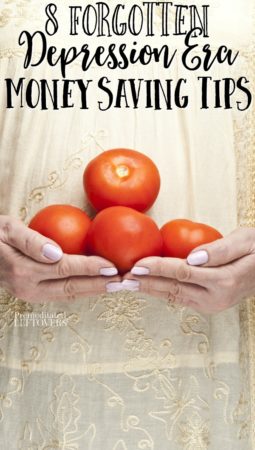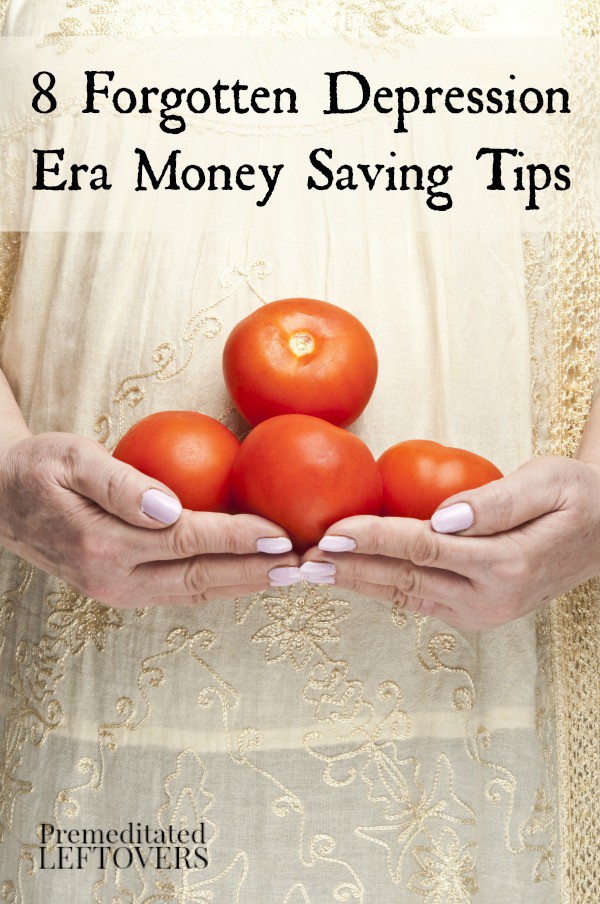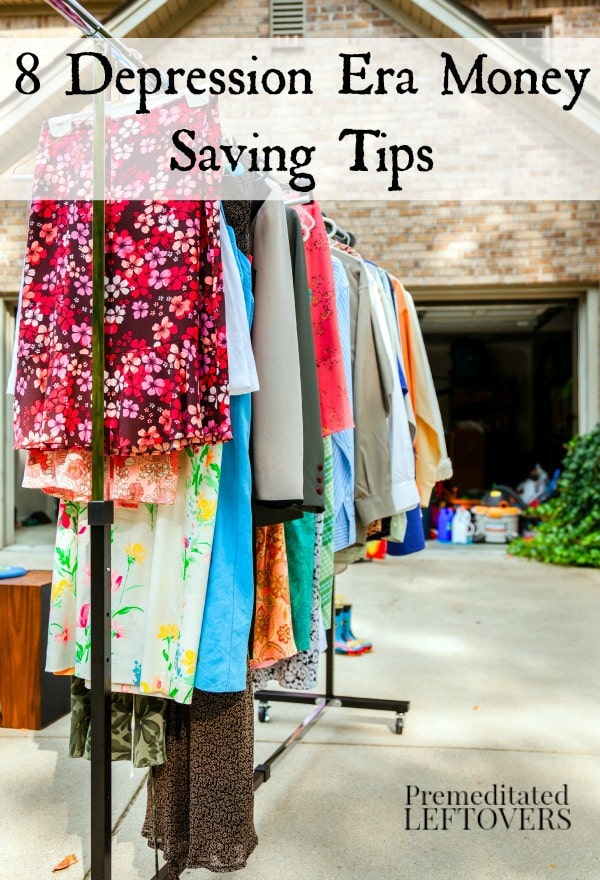You can start using these Great Depression Era money-saving tips today!
When most people think of the height of frugal living, the depression era is often the #1 time they think about. It was a time when most people didn’t waste anything, used their creativity and ingenuity to solve problems and managed to make it through, even when times were extremely tough and budgets simply did not exist because there was nothing to spend.
When I think of the depression era, I am reminded of how much we waste now and how they managed to use everything without even a complaint. It just was the way things were and everyone contributed to the household. If you would like to employ some good, old-fashioned money-saving tips that they used in the depression era to save your household some money, here are 10 forgotten Depression Era money-saving tips to start using now.
8 Depression Era Money Saving Tips
Learn the art of haggling.
People in the depression era didn’t just take the first quoted price for something. They knew how to trade, haggle, and make deals. We may not haggle these days outside of the car lot, but that doesn’t mean we can’t save money on the things we want. I keep notes of the items I need and then watch for sales on them. But it never hurts to ask when a store’s next sale will be.
Trading is starting to come back. More stores are offering to give you credit on used electronics when you are upgrading. Some stores buy back CDs, Vinyl Records, Books, or DVDs. Others buy back gaming equipment or phones. When you need a new item, see if you can, at least partially, fund it with something you no longer use.
While most of us are not comfortable haggling, you can use the internet to find the best price on an item. If you can offer proof of that price, some stores have a price matching guarantee.
Don’t shop for fun.
Recreational shopping wasn’t really an option for most people during the Great Depression. It is amazing how much money we waste when we shop because we are bored. Make it a habit to not do so. Bored? Pick up a deck of cards, work on a puzzle, call a friend, read a book, work in the garden, or choose another no-cost hobby to entertain yourself.
Buy used.
Many families bought things that their neighbors no longer needed in order to save money. This should be a priority for you if you are looking to save money especially when it comes to things like kids’ clothing, seasonal items, and even household basics. Check out your local thrift stores, Craigslist, eBay, or even Facebook Marketplace.
Shop locally.
You may be surprised by how cheap things are when you buy from local stores. Many people shop at big box stores because we have been trained as consumers to think they are cheaper. The truth is, they are often not cheaper and you can get great deals from local markets. This is usually true of farmers’ markets because you are shopping in-season as well.
Even if the price is higher, you may save money because you do not have to pay shipping costs. Have you ever had your online cart at $23 when the business reminds you that if you spend $35, you will get free shipping, so you buy a $13 item that you don’t really need to save $4.99 on shipping? Yeah, they trick you into spending more because you hate paying shipping costs.
Reduce the use of household products.
Most of us use too much dish soap, shampoo, and lotion as well as many other products. Reduce the amount you use and you may be surprised that it’s enough. This will save you from having to replenish personal care products, beauty products, and cleaning supplies as often.
If you read the back of the bottles, they will often say, “Use a pea-size amount”. Try just following the guidelines on the back of the bottle. Carefully look at the lines on the laundry soap measuring cup. Most of the time, you only need the amount at the lowest line, but we are in the habit of filling the whole cup using 3 – 4 times as much as we need.
My kids always use too much soap when watching their hands, so I fill the soap dispenser halfway with soap, then fill it the rest of the way with water. I put the lid on and then shake to mix the water into the soap.
Stretch your meat or skip it in meals.
Often, families did not have the money to have meat with most meals during the great depression. They stretched what meat they did have with beans and lentils. If you don’t feel you can go meat-free, try ubstituting beans or lentils for half the ground meat in your recipes. You will save money and consume much-needed fiber.
How to Build a Depression Era Pantry
Filling Depression Era Breakfast Recipes
Frugal and Flavorful Depression Era Recipes
Depression Era Tips to Stretch Your Food Budget
Don’t buy disposable things.
Disposable products simply didn’t exist during the Great Depression. Now, we live in a disposable era. But it is easy and much more frugal to trade paper towels for rags and sandwich baggies for reusable containers. Look at the disposable products you are buying and find a reusable resource in your home.
Try some holistic health.
In our grandparent’s time, it was expensive to see a doctor just like it is now, and it wasn’t unheard of to try weird concoctions for healing various ailments. Don’t use any of the disproved methods of former days! However, it may be smart to try things like essential oils for minor ailments before reaching for that medication or going to your doctor’s office for minor things like congestion from a cold.
More Old-Fashioned Money Saving Tips
More Money-Saving Tips from the Depression Era
60 Frugal Hacks from the Great Depression Era
Frugal Depression Era Gardening Tips





Suzanne Riddiford says
If you have like minded friends, trade services like minor repairs and cleaning for an hour or two.
As long as you both make sure not to abuse the situation it can help both of you greatly.
Jean Bush says
Has anyone noticed the past couple of years manufacturers of shampoo have made the bottle so the top can no longer be removed to add water to stretch out the shampoo?? All you have is a flip top & if you pour out too much you can’t get it back in the bottle.
Carla says
I use old pump lotion bottles and funnels to put soap shampoo conditioner in. Fill the original bottle with a little water to use up the remnants. Then just pump out whatever amount you want. Also you can dilute using water in the pump bottle. I use a swiffer wet jet from a couple years ago but fill the bottle when empty with vinegar a little dish soap(drops) and water to clean my floors. I also sewed dollar store micro cloths into envelopes and use them instead of disposable wipes on the wet jet. Just wash and use over . Works just fine.
Laura says
I remember my grandmother putting water in the ketchup bottle to get the last drop out. Also mixing whole milk with half of powdered milk to make it last longer. It was the opposite of the minimalists ideas now. Then they kept every thing they could find for they might have a need for it in the future. Today we think, toss it out and if i need it again I will just buy it again. So don’t think so badly of the normal hoarders, they just want to be prepared!
sam says
Thankyou, good ideas.
Jonni Rose says
Thanks for the post! I thought this was just normal living. Some folks just take it for granted that making huge piles of money and generatimg waste is not normal. Didn’t realize that this kind of frugality was a thing from a specific Era. Really enjoyed the read.
Kristen says
My grandmother said that she and her neighbors would have communal dinners. She would bring the vegetables, another neighbor would bring meat and another would bring bread and a side dish. They did this a few times a week and it cut down on food costs and allowed them to have a good time with friends.
Sandy / frugalable.wordpress.com says
I have a friend who has committed to not buying anything new for a year (other than the essentials). My sister did the same last year. Frugal living is becoming the “thing to do” and Im loving it!
Christine Wilcutt says
I would like to say that the cut onion in rooms does really keep the flu away. Try rubbing a cut, raw potato on any cut or abrasion or burn and it will heal quickly. I use a small bidet bottle (Blue Bidet) instead of toilet paper with cut up old wash clothes to dry. You will never go back to toilet paper again. The water cleans so well there is no mess. Grandma did have an outhouse and used Sears Roebuck catalog pages, ouch!
I dilute everything, use brightly colored bar mop clothes instead of napkins, placed in a pretty, flat basket by the sink. Though I use a dryer, I have learned when my non-peak times are and do it then to save money.
Stephanie says
My grandparents lived through the Great Depression and WWII and so as a child, I grew up watching them wash and reuse storage bags and foil. I still do it myself and it frustrates my house mates but I will never get the images of them doing this out of my brain. Nor do I want to!
I did want to comment on the whole concept of “haggling”… I am a single mom and a business owner offering a very specialized service. I’ve been doing my trade for years, and I am continually paying for webinars and classes on the most up to date processes in order for me to be the best I can be for my clients.
Now that I gave you a brief snapshot: I find it insulting when people haggle with me. Plan and simple. I used to tolerate it as I needed the work when I was first establishing my business and needed to feed my kid and keep a roof over our heads… now I just find it downright abusive and I politely turn down hagglers and move on when it occurs. While some companies are obviously trying to scam people, I think it’s unfair to make a business owner offering a valuable product or service feel inept over the price of a Starbucks or two. Tread carefully in the Haggle Zone.
Thanks for letting me voice my opinion! Great article overall!
Beth says
I agree with you completely. I’ve owned a business for over 15 years and find it insulting when people come in asking for a discount for whatever reason. Funny this is, it always seems to be people who would be shocked if I asked for one in return. Unless you’re at a flea market, mind your manners and either pay the price or not.
Tanya Campos-Gracia says
I wholeheartedly agree with you on that, especially if the haggling is done with a small business, local owner or farmer.
Amber Temerity says
I honestly believe that our grandparents had the best of wisdom. These are great tips! Thanks!
june says
Love this site. June
Linda says
I’m happy to say that I do some of the things on here. My daughter is still small, so I get the majority of her clothes at second hand stores. And at the end of each season, I look at the discounted clothes in regular stores to get some great deals on new clothing for her. Rarely, do I spend full price for clothing for her, unless she really needs it and I can’t get it right away at the second hand store or on sale (ie. bathing suit).